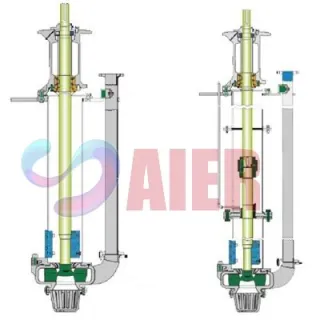നവം . 30, 2024 10:54 Back to list
Mechanical Seal Manufacturing for Slurry Pumps with Quality Assurance Standards
Understanding Slurry Pump Mechanical Seals A Focus on Factory Production
In the intricate world of industrial processes, slurry pumps play an indispensable role, particularly in the mining, construction, and wastewater management sectors. These pumps are specifically designed to handle abrasive and viscous materials. One critical component that ensures the efficiency and longevity of slurry pumps is the mechanical seal. This article delves into the significance of mechanical seals in slurry pumps, focusing on their production in factories.
The Role of Slurry Pump Mechanical Seals
Mechanical seals are vital in preventing leakage between the rotating shaft and the stationary parts of the pump. In slurry pumps, which often operate under high pressure and handle challenging materials, a reliable mechanical seal is crucial for maintaining efficiency and reducing downtime. The primary function of these seals is to create a barrier that keeps the abrasive slurry contained within the pump, thus preventing operational fluid loss and environmental contamination.
Due to the nature of the liquids and slurries they process, mechanical seals for slurry pumps must be constructed from materials that can withstand harsh conditions. These seals are subjected to intense wear and tear, so durability and reliability are paramount. Factors such as temperature fluctuations, pressure variations, and the chemical composition of the slurries also play a significant role in the design of these mechanical seals.
Manufacturing Process of Mechanical Seals
The production of mechanical seals for slurry pumps involves a meticulous process that combines advanced technology with skilled craftsmanship
. Factories specializing in these components typically follow several key steps1. Material Selection The first step is choosing appropriate materials that can endure the unique challenges posed by slurry pumping. Common materials include ceramic, tungsten carbide, and various elastomers. These materials are selected based on their hardness, chemical resistance, and thermal stability.
2. Precision Machining After the materials are selected, they undergo precision machining. This process may include turning, grinding, and lapping, ensuring that the surfaces of the seal components achieve the fine tolerances required for effective sealing. Precision is vital, as even slight imperfections can lead to leakage and pump failure.
slurry pump mechanical seal factory

3. Quality Control Rigorous quality control measures are implemented throughout the manufacturing process. Each mechanical seal is thoroughly tested for defects and performance issues. This stage includes pressure tests and operational checks to ensure that the seals meet industry standards.
4. Assembly Once the individual components have passed quality checks, they are assembled under controlled conditions. This step often requires specialized equipment to ensure that the seals are put together correctly without introducing contaminants.
5. Final Testing After assembly, the seals are subjected to final testing to verify their integrity and performance level. This testing simulates real-world operating conditions to ensure that the seals can perform reliably in the field.
Innovations in Mechanical Seal Technology
The manufacturing of slurry pump mechanical seals has benefited from numerous technological advancements. Innovations such as advanced coatings, improved lubrication strategies, and novel design concepts enhance the seals' performance and longevity. For instance, self-lubricating materials have been developed to reduce friction and wear, extending the operational life of the seals.
Moreover, the rise of smart technology in manufacturing has also begun to influence the production of mechanical seals. Sensors can be integrated into the pumps to monitor seal performance, providing real-time data that can help in predictive maintenance and timely interventions, ultimately reducing the risk of costly breakdowns.
Conclusion
In conclusion, the role of mechanical seals in slurry pumps is critical to ensuring operational efficiency and sustainability in various industries. The sophisticated processes employed in their production underscore the importance of quality and reliability in handling challenging materials. As technology continues to advance, we can expect further improvements in the design and manufacture of these essential components, solidifying their role in the future of industrial pumping solutions.
-
Top Submersible Pump Companies High Quality Manufacturers & Suppliers in China
NewsJul.08,2025
-
High Quality Seal for 5 Inch Dredge Pump Reliable China Manufacturer & Supplier
NewsJul.08,2025
-
High-Efficiency Slurry Sand Pump from Leading China Manufacturer – Durable & Reliable Solutions
NewsJul.07,2025
-
High-Quality Slurry Pump Made in China Durable Steel Mill Slurry Pump & Parts
NewsJul.07,2025
-
High Quality Excavator Dredge Pump Manufacturer & Suppliers from China – Reliable, Durable, Efficient Solutions
NewsJul.07,2025
-
Wholesale Slurry Pump Closed Impeller Supplier High Efficiency China Slurry Pump Closed Impeller
NewsJul.06,2025
